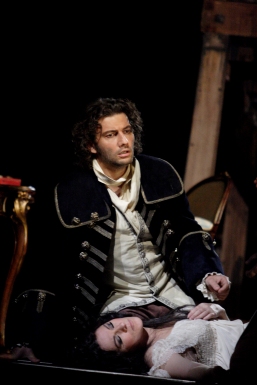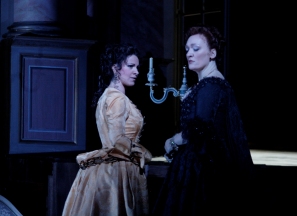In the event, Covent Garden's first glitzy star vehicle of the current season turned out to be a handsome ensemble piece, with three of the four leads bringing special gifts (though not quite the full picture) to their stagey roles, tender and nuanced yet less than ideally pacy conducting from Mark Elder and about as much interpretation and telling mise-en-scènes from director David McVicar as the piece can reasonably take.
Fans of tenor Jonas Kaufmann, and they are growing with good reason by the day, will no doubt tell you that he stole the show. Not exactly. His character, Maurizio, Count of Saxony - in reality a bit of an opportunistic shit, who'd already given up on his actress by the time he wooed the French aristocracy for further promotion - is a soldier and a lover, nothing more. Ideally that needs the honeyed tones of a true Italianate tenor rather than what Kaufmann has to offer in the middle range, a sometimes bottled baritonal timbre. In short, something between this and veteran Bonaventura Bottone's still-focused cameo of a slimy Abbé would be ideal. But Kaufmann's undoubtedly tenorial top register is infallibly strong and ardent, suiting the set-pieces of the second and third acts better than the gorgeous early lovesong "La dolcissima effigie" (bit naughty of Elder, perhaps, to go with the full stop for applause both here and in Adriana's "Io son l'umile ancella". The score should run continuously). I can't wait to hear his Florestan, Lohengrin and Siegmund.
 Yet the chemistry between Kaufmann and Gheorghiu (pictured right in the final scene) wasn't quite as touted. Dramatically she was at her most convincing not being smothered by rather awkward kisses but playing the child-actress to the paternal theatre-manager who discreetly gives up all hope of becoming her husband himself. Alessandro Corbelli was the one who gave the full picture, offering discreet intimations of the buffo roles in which we usually see him and showing a fresh dimension to his sympathetic stage presence with surprising, long-phrased ardour for Michonnet's - read perhaps Voltaire's - melancholy resignation. McVicar gave him plenty of help with the touching monologue he unfolds as he watches his Adriana in Racine's Bajazet from the wings.
Yet the chemistry between Kaufmann and Gheorghiu (pictured right in the final scene) wasn't quite as touted. Dramatically she was at her most convincing not being smothered by rather awkward kisses but playing the child-actress to the paternal theatre-manager who discreetly gives up all hope of becoming her husband himself. Alessandro Corbelli was the one who gave the full picture, offering discreet intimations of the buffo roles in which we usually see him and showing a fresh dimension to his sympathetic stage presence with surprising, long-phrased ardour for Michonnet's - read perhaps Voltaire's - melancholy resignation. McVicar gave him plenty of help with the touching monologue he unfolds as he watches his Adriana in Racine's Bajazet from the wings.
The stage, of course, is an important metaphor as well as a vehicle for Cilea's naturalistic sparkle in parts of the first and third acts. Adriana, Michonnet and their crew rule within their little world, but are paupers outside it, as the kitting-out and stripping-away of Charles Edwards's beautifully designed little wooden theatre indicate. Following a Judgment of Paris ballet in which Brigitte Reiffenstuel's costumes and Andrew George's stylishly camp choreography take centre stage, a wryly skewed homage to 18th-century illusionism, Adriana uses Phèdre's speech to wreak the only revenge she can against the wealthy before the scenery flies away for her unglamorous exit with her mentor.
 The aristocratic serpent in the garden is the Princesse de Bouillon, rather admirably played by mezzo Michaela Schuster (pictured with Gheorghiu left) as a pettish, vindictive figure of fun rather than a towering grande-dame rival. Which in a sense was to make good use of her limitations: a lustrous, clear middle and lower register but not quite the Italianate largesse we normally get in the role. Expect a different, if not necessarily better, interpretation from Olga Borodina in later performances.
The aristocratic serpent in the garden is the Princesse de Bouillon, rather admirably played by mezzo Michaela Schuster (pictured with Gheorghiu left) as a pettish, vindictive figure of fun rather than a towering grande-dame rival. Which in a sense was to make good use of her limitations: a lustrous, clear middle and lower register but not quite the Italianate largesse we normally get in the role. Expect a different, if not necessarily better, interpretation from Olga Borodina in later performances.
In Act Four, only her deadly gift to her love-rival represents La Bouillon, and the stage is left to Adriana in all her infinite variety. There's a relaxed little scene in which her theatrical chums cheer her up - all excellent, they're expertly led by a soprano who's played the prima donna herself recently, Janis Kelly - before tragedy takes over. We've seen Gheorghiu's mad/doomed act before, but it's reasonably effective, and she remains peerless in bel canto artistry, the skill in lifting a phrase from the heart to the heights, even if the sound can be a little soft-grained at times. As was the orchestra from my not ideal seat in the stalls circle, never the best place to judge. Elder brought out all the subtle colours which reveal Cilea as nearly, if not quite, Puccini's match, and certainly Massenet's, even if the experienced conductor took his time over the ultimate sunset glow.
Where the composer falls short of Puccini the supreme stage master, inevitably, is in his less than dramatic curtains. But that's a virtue in the quiet cadences of the final scene, a very beautiful duet and a slow death which restores Adriana, in one final curtain-before-the-curtain, to her dramatic pre-eminence. I came away with a quiet admiration for this bunch of Parma Violets. Unlike his Countess, Cilea doesn't really do poison well, but his tender concern for his characters brings the odd tear to the eye and an ultimate leave-taking which wafts us charmingly out of the auditorium.
- Adriana Lecouvreur at the Royal Opera until 10 December
- Listen to the Radio 3 broadcast on Saturday 4 December
- Find Angela Gheorghiu's recordings on Amazon
- See what's on at the Royal Opera in 2010-11















Add comment